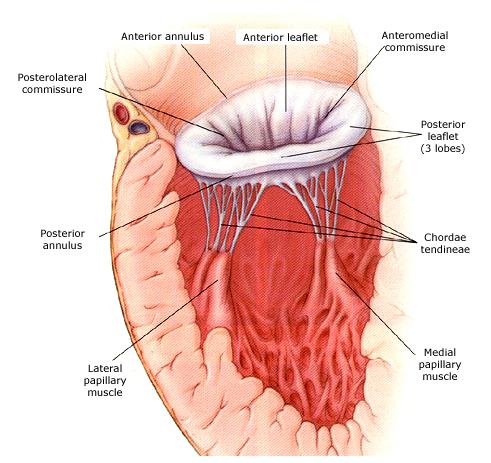mitral regurgitation

In mitral valve regurgitation, as the left ventricle pumps blood into the aorta, some blood leaks back into the left atrium, increasing blood volume and pressure there. The increased blood pressure in the left atrium increases blood pressure in the veins leading from the lungs to the heart (pulmonary veins) and causes the left atrium to enlarge to accommodate the extra blood leaking back from the ventricle.
Mitral regurgitation, also called mitral valve regurgitation, mitral incompetence, or mitral insufficiency, is a failure of the mitral valve of the heart to close properly, allowing blood to leak back into the left atrium (upper chamber) when pumped out of the left ventricle (lower chamber). The disorder may occur in conjunction with mitral stenosis (narrowing of the valve).
In mitral regurgitation, the left side of the heart must work harder to clear the regurgitated blood. Eventually, left-sided (and later, right-sided) heart failure may develop; generally, however, this is not a life-threatening condition. A build-up of blood from the left side of the heart can result in pulmonary edema.
Causes and incidence of mitral regurgitation
The most common cause (though much less common than it once was) is damage to the valve as a result of rheumatic fever – a childhood illness that sometimes occurs after untreated strep throat or scarlet fever. Today, rheumatic fever is rare in the developed world, where antibiotics are widely used to treat infections. In the US, Europe, and other developed regions, the commonest causes of mitral regurgitation are mitral valve prolapse following a heart attack (myocardial infarction), and stretching of the vale due to enlargement of the ventricle in left-sided heart failure. Rarely, the disorder may be present from birth or occur as part of Marfan syndrome.
Symptoms and signs of mitral regurgitation
The characteristic symptoms of mitral regurgitation are increasing breathlessness and fatigue, sometimes accompanied by palpitations. Later, as right-sided heart failure develops, the ankles swell.
An occasional complication of mitral regurgitation is endocarditis affecting the valve. Another risk is that a thrombus (blood clot) may form in the left atrium and travel to the brain, resulting in a stroke.
Diagnosis
A diagnosis is made from the patient's history, from a characteristic heart murmur heard through a stethoscope, and from the results of chest X-rays, an electrocardiogram (EKG), and an echocardiogram. cardiac catheterization is performed in some cases, in particularly when surgical correction is being considered.
Treatment and outlook
If breathlessness is troublesome, a diuretic drug may be prescribed to reduce fluid in the lungs and other tissues. Digitalis drugs may be given to increase the force of the heart's contraction and to control rhythm disturbances. Anticoagulant drugs may be given to prevent the formation of blood clots. Before undergoing dental or other surgery, a person with mitral valve disease should take antibiotics to prevent a blood infection that could cause endocarditis.
Heart valve surgery is considered only if severe heart failure develops or if drug treatment fails to prevent the patient's symptoms from becoming severe and disabling.
The outlook for mitral regurgitation is good whether it is treated by drugs or by surgery. Breathlessness and fatigue cannot be relieved by treatment once there has been permanent heart damage.


